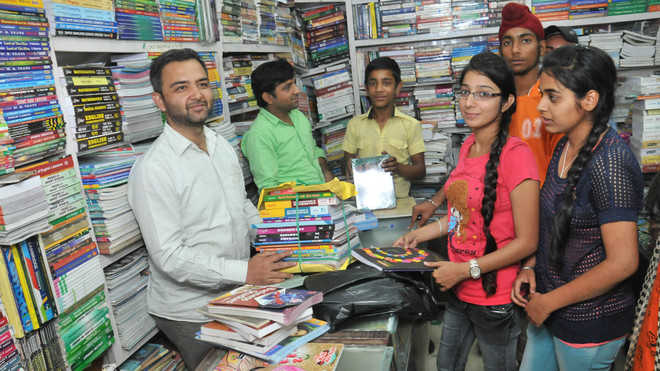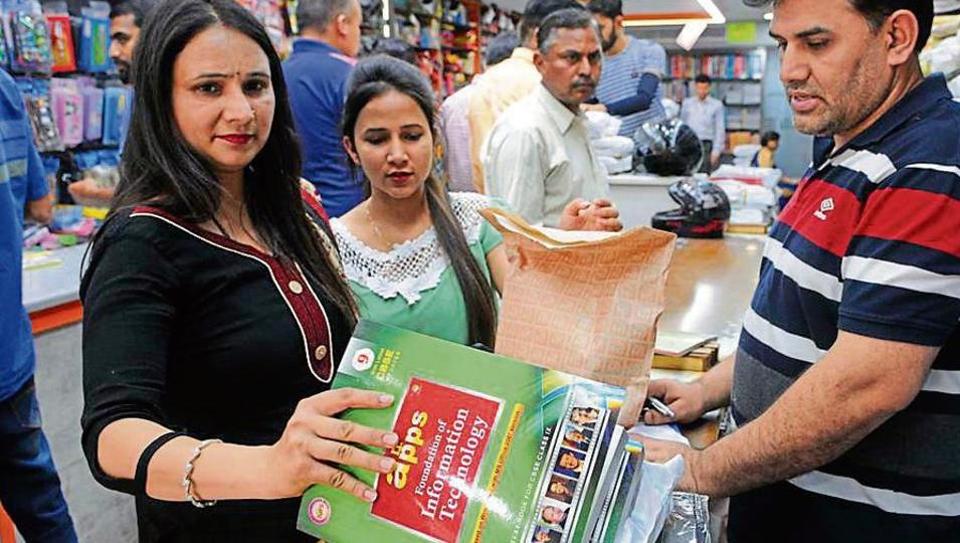The Secret Handshake: Private Schools Operating ‘Bookseller’ Business Model – A Scam Year After Year Of Looting Parents.
The academic year is over, and it is time for children to move up the ladder and into the next standard. While this is an accomplishment for the students, for true, but equally so for the parents. And with a new academic year, there is yet another act that the parents must endure - buying expensive school books from the shops inside the school or the once dedicated outside, as if enrolling their children into expensive private schools is not enough. But what is the issue here? That the parents must buy from the 'designated' shops or have their child's name struck off from the school!

Indian parents strive to send their children to private schools for several reasons, despite the high fees they may have to pay.
We will discuss these reasons a bit later in the article; however, one thing needs to be established first – parents of children studying in private schools have no easy out.
Unfortunately, private schools in the country have made education a point of nothing more than pure business, and the sad reality is that the parents know and fully comprehend the vicious cycle they are in, yet there is little they can do.
Private schools are the centres or rather business hubs, and therefore, the target is logical – profiteering and have, over time, transformed into booksellers!
The parents, in complete understanding, can do little about it and end up contributing and partaking in the bookseller model and, therefore, become victims of cheat policies of private schools year after year and are forced to buy books at high prices!

The Bookseller Model: An Albatross Around The Neck
The ‘bookseller’ business model involves private schools tying up with specific publishers or bookstores and mandating parents to purchase books and other educational materials from them. In some cases, the books and materials are overpriced, and parents are left with no choice but to buy them from the designated bookstore.
Thus the ‘bookseller’ business model is nothing but a handshake agreement between private schools and designated bookstores. Private schools tie up with specific publishers or bookstores and mandate parents to purchase books and other educational materials from them. In turn, the designated bookstore benefits from having a captive market and an exclusive opportunity to sell books and materials to students and parents.
This practice has been criticized as it restricts competition and leads to an unfair advantage for the designated bookseller. In addition, it places an additional financial burden on parents who are already paying high fees for their children’s education.
So what does this actually imply?
It means that the parents are seen as nothing more than money-providing entities, and they must cooperate or have their child removed from the school. More importantly, it also signifies that the parent’s rights are restricted to enrolling their child into the expensive looting private schools. Still, the private schools, in turn, hold all the cards and the end decision-making authority.
Now the question is, why do parents want their children to study in private schools?
1. Quality of Education: Private schools in India are often perceived to offer a better quality of education than public schools. This is because private schools generally have better infrastructure, facilities, and teaching resources, which can lead to better academic results and career prospects for students.
2. Curriculum and Teaching Methods: Private schools in India are thought to offer specialized curriculums and teaching methods that may not be available in public schools. This can help children to develop skills and knowledge that are essential for their future success.
3. Safety and Discipline: Private schools in India are often perceived to be safer and more disciplined than public schools. Private schools generally have stricter rules and regulations, which can create a more orderly and conducive learning environment for students.
4. Networking and Social Connections: Private schools often attract students from wealthy and influential families, which can provide opportunities for networking and social connections. These connections can be valuable in building careers and business relationships.
Overall, Indian parents strive to send their children to private schools because they believe that private schools offer a better quality of education, specialized curriculums, safer and more disciplined environments, and valuable networking opportunities.
Hence, while private schools may be expensive, parents see the investment in their children’s education as a worthwhile expense that can lead to long-term benefits.

Private Schools: Education Side Business And Selling Books Main Business?
It is not appropriate to generalize that all private schools in India scam parents with a ‘bookseller’ business model. However, it is true that, by and large, this is the modus operandi of nearly every private school.
What has become a norm is that one is forced to buy not only books but also mandatory stationery, like notebooks and their covers, from these designated shops.
This model can benefit private schools by way of revenue generation; Private schools can generate revenue from commissions earned on the sale of books and materials by the designated bookstore.
More so, if the school has an in-house bookstore, then these booksellers organize sales every year and end up making a substantial amount in lakhs of rupees.
For the designated bookstore, this model provides an exclusive opportunity to sell books and materials to a captive market, which can result in increased sales and revenue.
Therefore, it is apt to say that the ‘bookseller’ business model adopted by some private schools in India can be a bane for parents, especially those who are less wealthy but want their children to study in well-reputed schools. The model can create several challenges for such parents, including:
1. Additional Financial Burden: The designated bookstore often charges a premium price for books and educational materials, making it difficult for less wealthy parents to afford them. This can put an additional financial strain on parents who are already struggling to pay for their child’s education.
2. Lack of Choice: Parents may not have the option to purchase books and materials from other sources, as the school may mandate the purchase from the designated bookstore. This lack of choice can result in parents being forced to pay inflated prices for books and materials they could have purchased at a lower cost elsewhere.
3. Unfair Advantage: The designated bookstore may have an unfair advantage over other bookstores as they are the only ones authorized to sell books and materials for a particular school. This can lead to a lack of competition, resulting in higher prices and poor-quality books and materials.
Private School’s Book Seller Model Crippling And Enchroaching Fundamental Right To Good Education
The Association of Parents of School Students have been knocking at the government’s door in this regard but to no avail. They have been consistently raising this issue for several years, but nothing has come of it.
In Conclusion: According to the rules, while private schools can include books other than NCERT in the curriculum as well as sell books but they cannot put pressure on or force parents to buy books but do you think that these rules can be put into practice when the lobbying of private schools is so robust that even the government bends itself before it!




